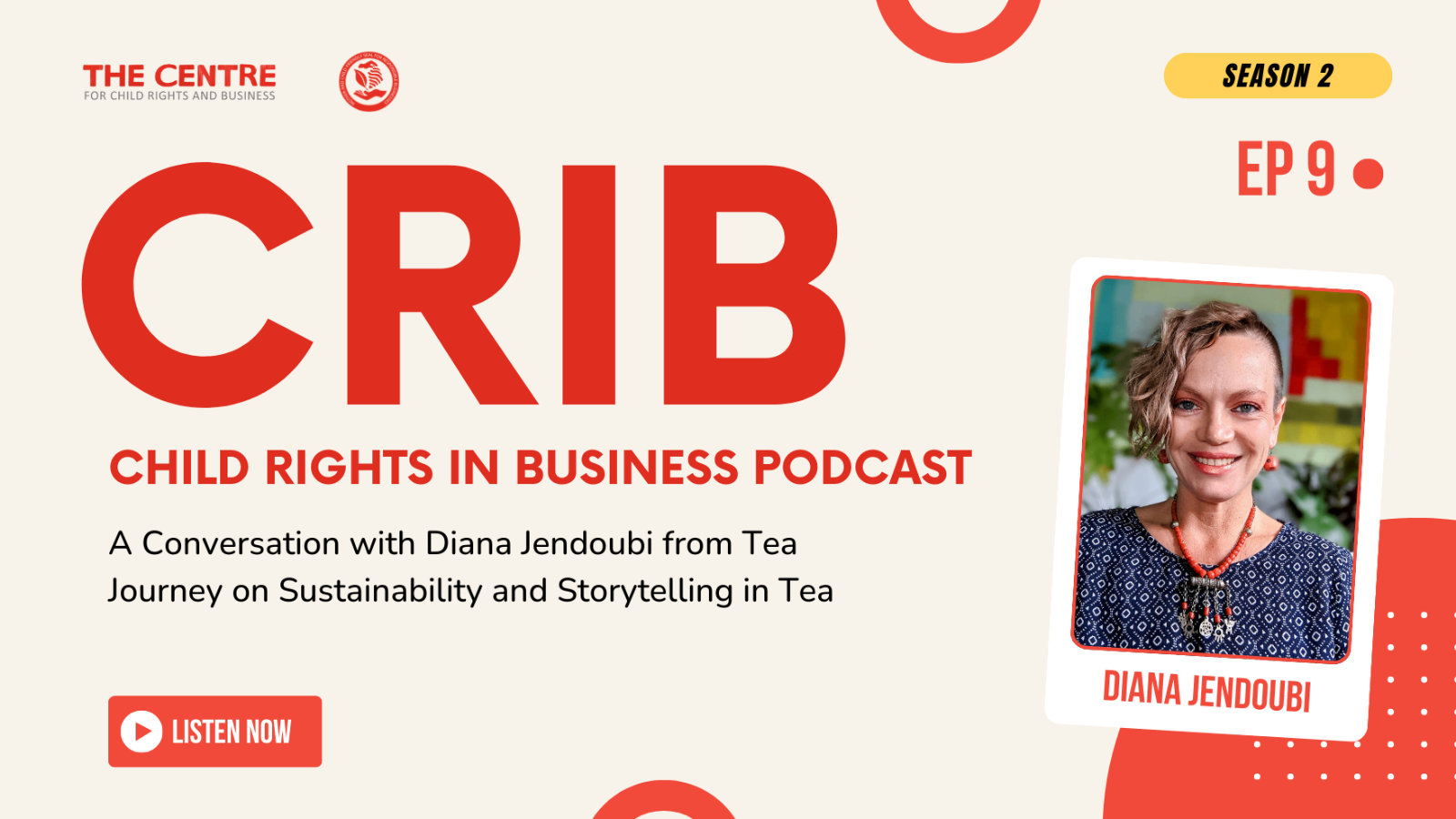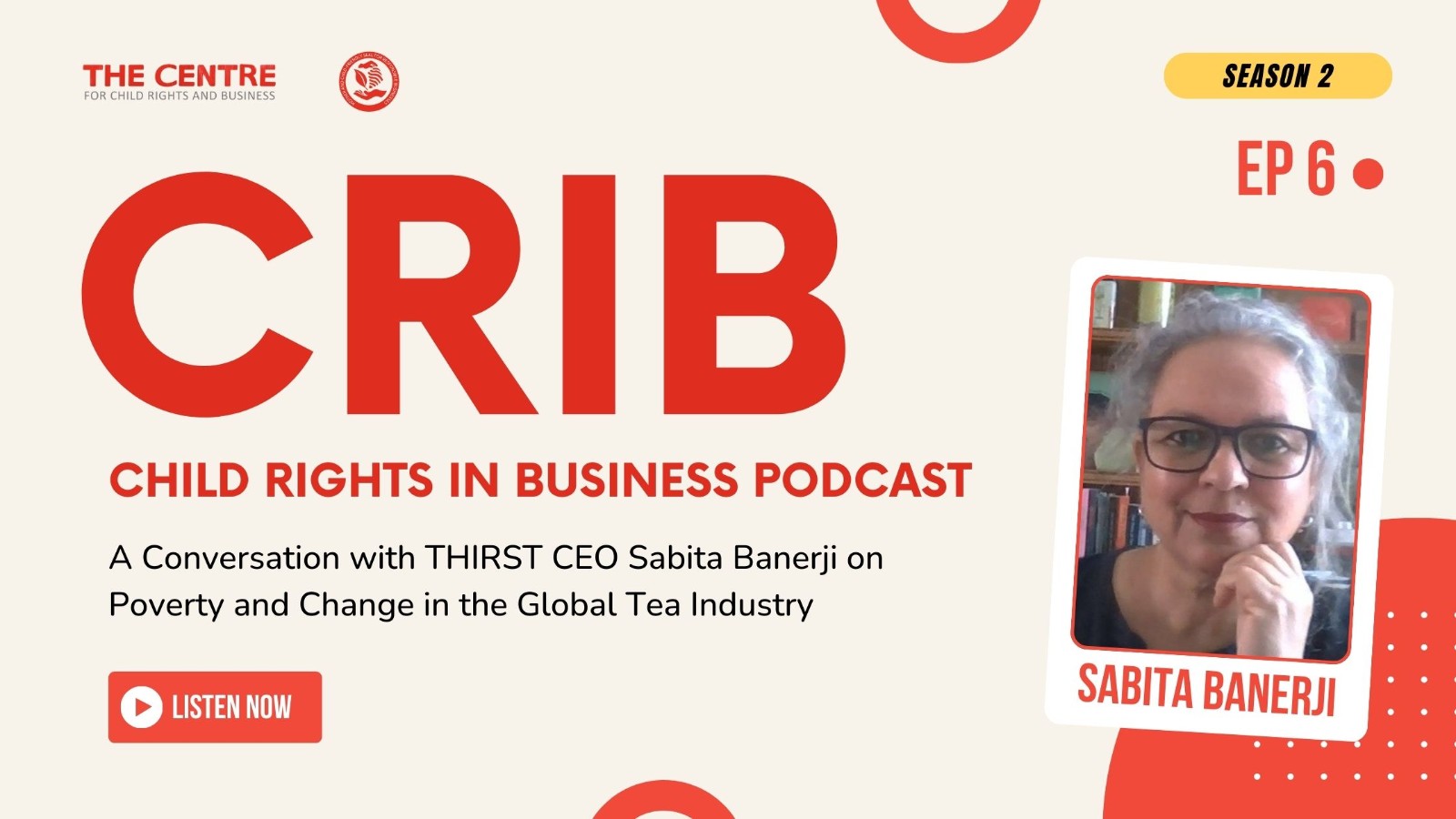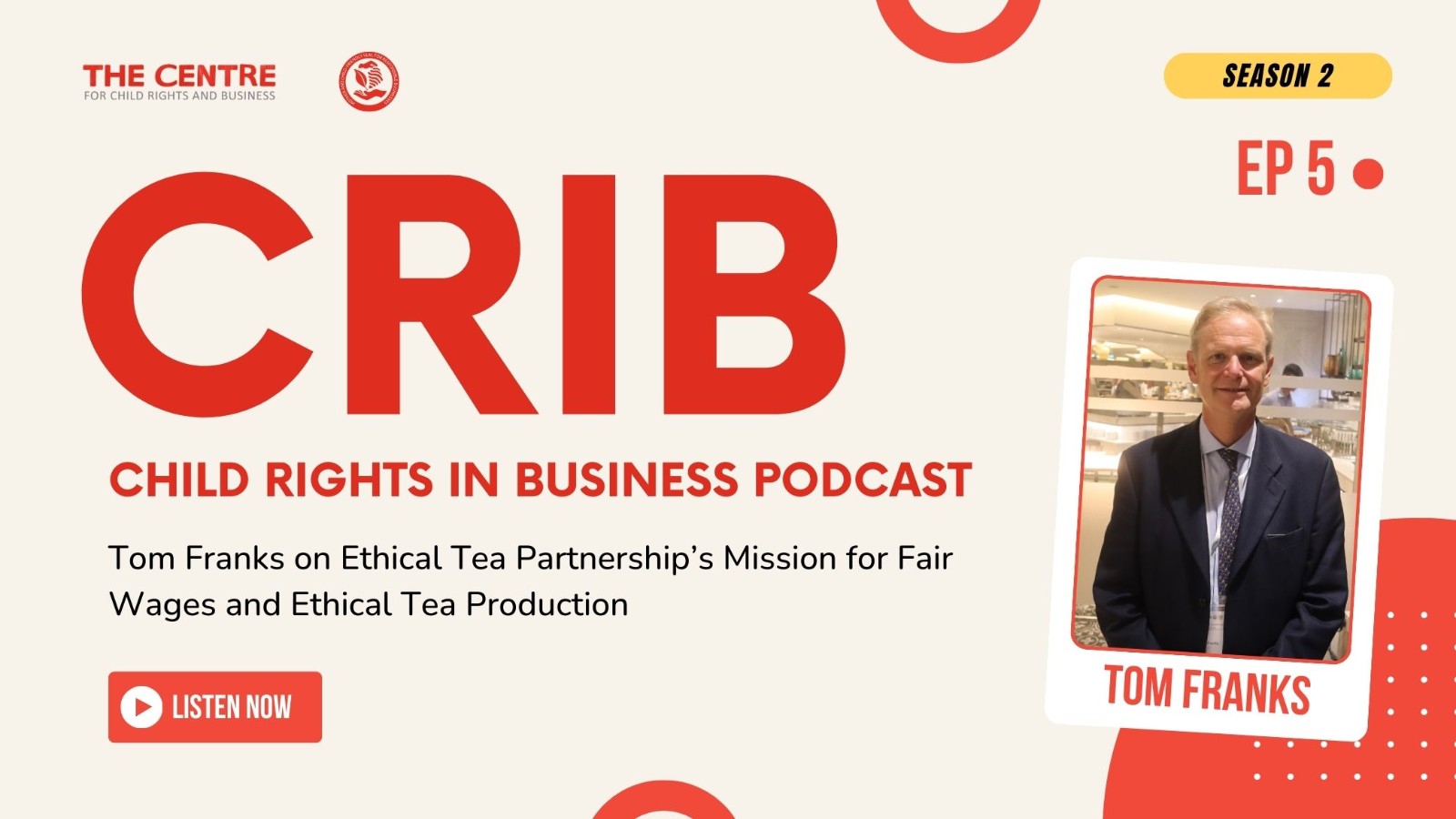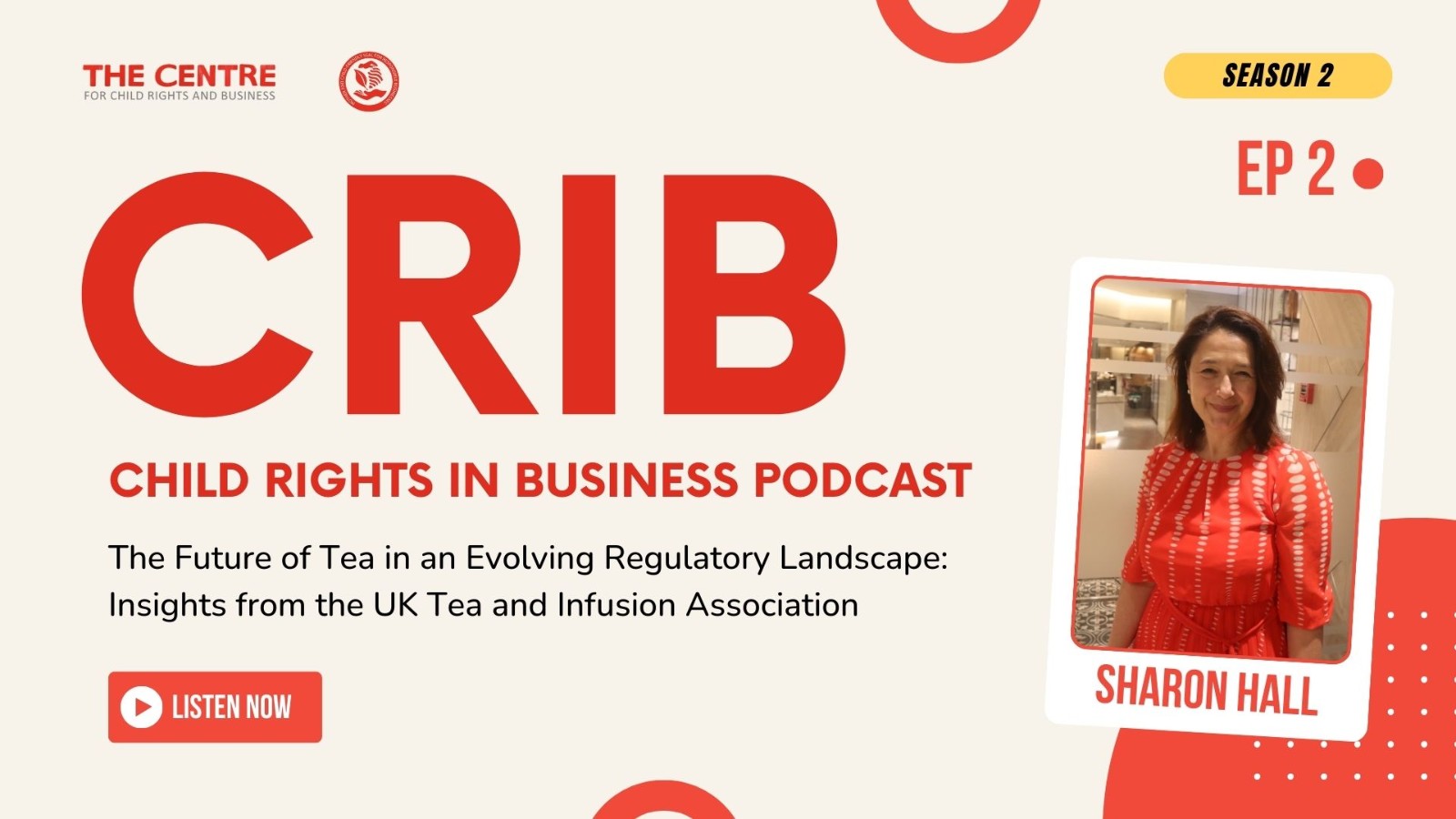
The CRIB – Child Rights in Business Podcast is back for a second season. Following on from our insightful discussions about women’s and children’s rights in Sri Lanka’s tea industry with key experts and voices engaged in the Sri Lankan tea industry, Season 2 takes a more global perspective on issues affecting human rights and the sustainability of the industry against a backdrop of increased human rights due diligence legislation.
Episode 9: A Conversation with Diana Jendoubi from Tea Journey on Sustainability and Storytelling in Tea

Guest speaker: Diana Jendoubi, Writer, Tea Journey
Host: Ahila Thillainathan, Country Director of Sri Lanka, The Centre for Child Rights and Business
In the final episode of Season 2 of the CRIB Podcast, we sit down with Diana Jendoubi, a writer for Tea Journey. Diana shares her insights on Sri Lanka’s tea industry, what drives sustainability, and the role of consumers in supporting tea communities. Plus, we learn more about Tea Journey, a digital magazine bringing global stories from the tea world in over a dozen languages.
Listen on Apple Podcasts here.
Listen on Apple Podcasts here.
Listen on Spotify here.
Listen on Youtube here.
Listen on Amazon Music here.
Listen on Audible here.
Episode 8: Simon Bell on Fair Wages and Local Empowerment at Amba Estate

Guest speaker: Simon Bell, Co-Founder, Amba Estate
Host: Ahila Thillainathan, Country Director of Sri Lanka, The Centre for Child Rights and Business
In this episode, our Sri Lanka Country Director Ahila Thillainathan sits down with Simon Bell, co-founder of AMBA Estate, a social enterprise that is reshaping the Sri Lankan tea industry through sustainable practices and local community empowerment.
Simon shares how AMBA Estate’s unique approach—focusing on fair wages, local hiring, and creating opportunities for skill development—has made it a model of responsible business in Sri Lanka. He discusses the challenges of the traditional tea industry and how AMBA’s people-centric practices are attracting a new generation to work in tea. From revenue-sharing models to career advancement for workers, Simon offers insights into creating a thriving business that benefits both employees and the broader community.
The Centre recently collaborated with Amba Estate to co-host an experiential workshop on agri-tourism for small to medium-sized estates and factories. In the following video, Simon Bell discusses how Amba Estate built a sustainable model that creates value-added products, fair wages, and jobs, empowering local communities through skill-building and dignified work. Workshop participants also reflect on what they learned. Watch the video here.
Listen on Apple Podcasts here.
Listen on Spotify here.
Listen on Youtube here.
Listen on Amazon Music here.
Listen on Audible here.
Episode 7: A Conversation With Ahmad Tea on Fair Wages

Guest speaker: Dr. Ebrahim Afshar, Managing Director or Admad Tea Company
Host: Ines Kaempfer, CEO, The Centre for Child Rights and Business
In Episode 7, we bring you a conversation recorded live at this year’s Colombo Tea Convention. Our CEO, Ines Kaempfer, sits down with Dr. Ebrahim Afshar, Managing Director of Ahmad Tea, to discuss a critical issue: ensuring fair wages for tea workers.
They explore how Ahmad Tea is challenging the status quo, pushing for tea prices that truly benefit the farmers, and encouraging consumers to support products that meet living wage criteria. Dr. Afshar also introduces a new initiative focused on making direct digital payments to tea pluckers—an important step towards paying fair wages.
Listen on Apple Podcasts here.
Listen on Spotify here.
Listen on Youtube here.
Listen on Amazon Music here.
Listen on Audible here.
Episode 6: A Conversation With THIRST CEO Sabita Banerji on Poverty and Change in the Global Tea Industry

Guest speaker: Sabita Banerji, CEO and Founder, THIRST
Host: Ahila Thillainathan, Country Director of Sri Lanka, The Centre for Child Rights and Businesss
In Episode 6 of the CRIB Child Rights in Business podcast, we discuss challenges related to poverty among tea workers in the global tea industry with Sabita Banerji, CEO and Founder of THIRST, interviewed by Ahila Thillainathan, Sri Lanka Country Director for The Centre for Child Rights and Business.
Despite tea being the world’s second most popular drink after water, the workers who produce it often live in poverty. Sabita sheds light on why this is the case, explaining how the denial of poverty within the tea sector keeps workers from achieving acceptable living standards and the role Thirst plays in raising awareness of this. As young people leave the industry in search of better opportunities, Sabita highlights the importance of acknowledging the problem and taking collective responsibility to address it.
This episode also explores how consumers can play a role in creating change. Sabita argues that it’s not just about paying more for tea, but about understanding its true value—both in terms of quality and ethics. The conversation also covers creative solutions to achieving living wages for tea workers, gender equity and what the future of the tea industry could look like.
Join us for this insightful discussion.
Listen on Apple Podcasts here.
Listen on Spotify here.
Listen on Youtube here.
Listen on Amazon Music here.
Listen on Audible here.
Episode 5: Tom Franks on Ethical Tea Partnership's Mission for Fair Wages and Ethical Production

Guest speaker: Tom Franks, Chair or The Ethical Tea Partnership
Host: Ines Kaempfer, CEO, The Centre for Child Rights and Business
In the this episode of thee CRIB Child Rights in Business podcast, we sit down with Tom Franks, Chair of the Ethical Tea Partnership (ETP), to explore the critical issues facing the global tea industry today. ETP is a global organisation focused on catalysing systemic change in the tea sector, with a particular emphasis on improving the lives of workers at the origin of tea production.
The conversation covers the complexities around achieving living wages for tea workers, gender equality, and responsible sourcing. Tom also delves into how ETP is aligning its practices with new human rights due diligence guidelines like the OECD and UN Principles while addressing the practical challenges faced by both large and small-scale tea packers.
Join us for an eye-opening episode that looks at the challenges and opportunities in the tea sector and the role ETP plays in promoting ethical business practices.
Listen on Apple Podcasts here.
Listen on Spotify here.
Listen on Youtube here.
Listen on Amazon Music here.
Listen on Audible here.
Episode 4: Tealet Founder Elyse Petersen's Vision for Ethical and High-Quality Tea
.jpg)
Guest speaker: Elyse Petersen, Founder of Tealet
Host: Ahila Thillainathan, Sri Lanka Country Director, The Centre for Child Rights and Business
In Episode 4 of the CRIB Child Rights in Business Podcast, The Centre’s Sri Lanka Country Director Ahila Thillainathan sat down with Elise Peterson, founder of Tealet, an innovative B2B marketplace that is on a mission to transform the tea industry.
Elyse details how Tealet facilitates direct trade between independent, family-owned tea farms and business buyers, with an emphasis on transparency and high-quality tea. She explains Tealet’s innovative approach, including its decentralised organization model and open enrollment system for suppliers, which ensures transparency and fair transactions.
Elyse also highlights her mission to give tea producers a platform to be heard, advocating for their rights and amplifying their voices in the market. She discusses the significant value and quality differences in tea and how Tealet supports small producers in achieving premium pricing for their high-calibre teas.
With growing consumer demand for ethical products, Elyse shares her vision of creating a more transparent and equitable market that values both tea quality and producer empowerment. Make sure to tune in!
Listen on Apple Podcasts here.
Listen on Spotify here.
Listen on Youtube here.
Episode 3: Sustainability, Human Rights and Gender Equity in Tea: A Conversation with Madhuri Nanda from Rainforest Alliance

Guest speaker: Madhuri Nanda, Director of South Asia at Rainforest Alliance
Host: Ines Kaempfer, CEO, The Centre for Child Rights and Business
In Episode 3 of Season 2 of the CRIB - Child Rights in Business podcast, The Centre's CEO Ines Kaempfer sits down with Madhuri Nanda, Director of South Asia at Rainforest Alliance for a conversation about Rainforest Alliance's work in the tea sector and some of the lesser known landscape level work they do to promote sustainable agriculture, human rights issues and gender inequality, beyond their well-established certification programme.
Listen to learn about Rainforest Alliance's work in sustainable agriculture, with a focus on the tea industry in Sri Lanka and India, a new pilot programme with The Centre that aims to create gender champions in tea estates and more. Madhuri highlights the shift from a pass/fail certification approach to an "assess and address" method, which encourages tea producers to actively identify and tackle social issues like gender inequality, human rights concerns, and livelihoods. She also stresses the importance of shared responsibility between producers and buyers to drive sustainability and discusses how we can move beyond sustainable agriculture toward regenerative agriculture to restore soil health, biodiversity, and improve livelihoods in the tea sector.
Listen on Apple Podcasts here.
Listen on Spotify here.
Listen on Amazon Music here.
Listen on Audible here.
Episode 2: Insights from the UK Tea & Infusions Association About the Future of Tea in an Evolving Regulatory Landscape

Speakers: Sharon Hall, Chief Executive of the UK Tea & Infusions Association
Host: Ines Kaempfer, CEO, The Centre for Child Rights and Business
In Episode 2 of the CRIB Child Rights in Business podcast, The Centre's CEO Ines Kaempfer sits down with Sharon Hall, Chief Executive of the UK Tea & Infusions Association.
Their conversation leads us through the history and work of the UK Tea & Infusions Association, and some of the implications of the evolving human rights due diligence regulatory landscape, both in post-Brexit UK and in the EU. They discuss what these changes might mean for the tea value chain and for consumers, as well as other insights.
Listen on Apple Podcasts here.
Listen on Spotify here.
Listen on Amazon Music here.
Listen on Audible here.
Episode 1: A Conversation about Tea Sustainability with the Canadian Tea and Herbal Association

Speakers: Shabnam Weber, President of Tea and Herbal Association of Canada
Host: Ines Kaempfer, CEO, The Centre for Child Rights and Business
In Episode 1, The Centre’s CEO Ines Kaempfer sat down for a conversation with Shabnam Weber, President of Tea and Herbal Association of Canada during the 2024 Colombo International Tea Convention. Prior to the recording, Shabnam had spoken on a panel discussion about wages and pricing. In this conversation, Ines and Shabnam explore the topic further and offer their thoughts on the pain points that need to be addressed to resolve the fact that pricing needs to allow for fair wages for workers.
The conversation also discusses the issue of tea's value and how it’s crucial for the industry and retailers to rethink their pricing to stop the practice of selling tea below the price of production.
"The biggest issue within this industry, and we've heard this quite a bit, is tea is too cheap...Consumers do not pay enough for their product. Our product is used as a loss leader by supermarkets. And that has to stop. And I really believe that we as an industry need to take control back into our hands,” Shabnam says on Episode 1.
Tune in to learn about the impact of human rights due diligence laws on business models, particularly in Europe, successful initiatives by the Tea and Herbal Association of Canada, including a global campaign called “Tea Power” and an education programme promoting tea knowledge, and the importance of collaborative efforts to address industry challenges and promote sustainable practices.
Listen on Apple Podcasts here.
Listen on Spotify here.
Listen on Amazon Music here.
Listen on Audible here.
By using this website, you agree to our use of cookies. We use cookies to provide you with a great experience and to help our website run effectively.